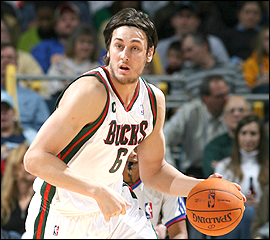You know it’s been a long season for the Milwaukee Bucks when a 93-89 overtime loss to the Orlando Magic in their 67th game, sans Andrew Bogut (migraine), becomes an instant 2010-11 classic.
By Jake McCormick
Most of those highlight plays came off the fingers of Brandon Jennings (23 pts, 8-20 fg, 8 asts), who scored the Bucks’ first nine points off long range jumpers, hit three straight free throws with 4.3 seconds left in regulation to send the game to overtime, and completed a four point play in overtime to bring Milwaukee even with Orlando for the last time.
John Salmons (22 pts, 10-19 fg, 7 rbs, 5 asts) added his fair share of drives, kicks, and mid-range jumpers, but the Bucks still failed to break the 90 point barrier for the 32nd time this season.
Defense was the real reason Milwaukee stuck around with Orlando until the 52nd minute, even without Bogut as their interior anchor. The 2010-11 Bucks typically miss their shooting target more often than the bad guys in Commando, but that fact has masked a defense that will go down in franchise history as one of its best ever.
Defense has rarely been a subject of coach Scott Skiles’ ire in his post-game press conferences this season, and for a very good reason. The 2010-11 Bucks have put together their best statistical defensive season since setting the franchise record with 90 points allowed per game in 1998-99. For what it’s worth, that was only 11th best in the NBA that season.
The Bucks currently rank third and fourth, respectively, in defensive points allowed (92.5) and defensive points per 100 possessions (99.7), both of which are lower than their 2009-10 totals (96 ppg and 100.9 pp100). Even against quality playoff teams like the Magic, the Bucks defense has answered that call when the offense hits the snooze.
Playoff caliber NBA teams will usually win games where they hold opponents at or below their season average for points allowed, especially against the best the league has to offer. For example, the Chicago Bulls have an 18-1 record when they hold current playoff teams, or opponents with records at or above .500, to 91 points or less.
Likewise, the New Orleans Hornets (15-3), Boston Celtics (12-9), and Orlando Magic (10-6) have similar records in the same situation against the NBA’s top teams. The Milwaukee Bucks crash that party with a 9-16 record when they prevent playoff-caliber teams from scoring more than 93 points.
That’s a total of 25 times (more than the Hornets, Bulls, Celtics, and Magic) where the Bucks defense performed better than their season average against the NBA’s best teams.
LeBron James, or the Magic’s Dwight Howard on Wednesday, can almost single-handedly change a game’s course through dominant offense. However, the Bucks are living proof that a single player can be a very significant cog on defense without being the definitive reason for the unit’s success.
A good NBA defense is less a matchup of individuals and more about five players gelling and moving like an amoeba to collectively prevent easy shots inside and out. Milwaukee relies on a solid interior presence to force opponents to take contested jumpers, and the Bucks are ranked fourth in shot attempts (22.5) and shooting percentage (60.7%) at the rim.
“Coach Skiles does a good job of preparing us defensively,” Luc Mbah a Moute said after Wednesday’s loss. “Whether Bogues is there or not, it’s just the system in which we play.”
Pointing out the Bucks’ league-best ability to hold their toughest opponents to 93 points or less brings everything full circle to the team’s offensive ineptitude. As long as there is an elite defensive system in place, one player rising to the occasion or finding shot consistency will vault the future Bucks back into the discussion as a legitimate playoff threat.
Follow Jake on Twitter.
